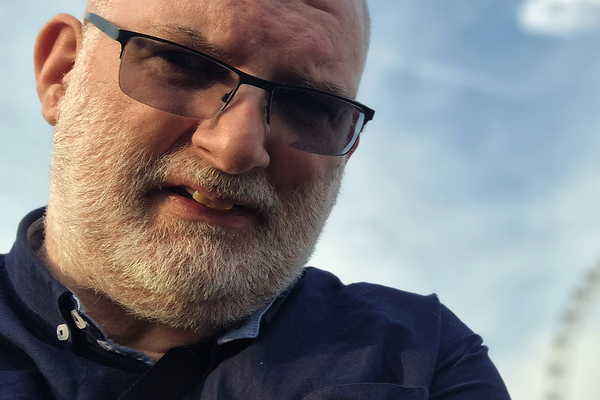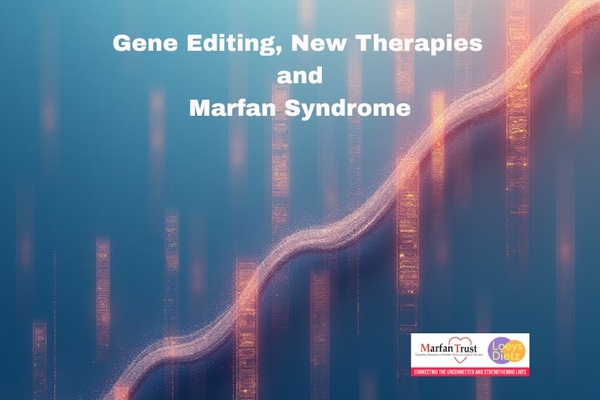Behind every diagnosis of Marfan lies a personal journey of emotional twists and turns as the condition takes its course. Patients can often feel isolated by their symptoms and suffer psychologically, as Anna describes so beautifully and candidly in her blog on Mental Health & Marfan Syndrome.
The Mental Health Experience of Living with Marfan Syndrome
by Anna Gould
Despite being principally a physical illness, Marfan syndrome has significant mental health impacts. I have dealt with the mental implications of the disorder throughout my life although it has taken me a long time to fully accept the reality of the Marfan syndrome mental toll. Beyond Marfan syndrome, I have obsessive-compulsive disorder, anxiety, and depression. While these are distinct conditions, my experience with these has been further moulded by my lived experience with Marfan syndrome and vice versa.
Growing up, I was deeply ashamed of my diagnosis. I struggled with feeling and looking different. My condition was a secret that I held very close, and I only told very select people. I could barely even say the words “Marfan syndrome” out loud because of how emotionally charged they felt. The few times I did share my diagnosis, I choked it out like a confession. I hated anything that “exposed” my condition, whether it be activity restrictions, Holter monitors, or the physical signs.
I thought that anyone who knew would see me as weak just like I viewed myself. I dreaded the restrictions Marfan syndrome imposed on my life. My cardiologist gave me the green light to play soccer when I was in elementary school. The caveat: as soon as it became competitive, I would have to quit. All my friends were on my team, and I was terrified of having to explain why I no longer could play. Similarly, I dreaded every winter season when I would have to opt out of skiing and every amusement park invite that I had to pass on. I wanted to physically participate in these activities, but I really wanted to be like everyone else my age. Even more, I despised the physical manifestations of Marfan syndrome. Every time someone pointed out my height or my weight, I was reminded that I looked different and it was because of my medical condition. I especially hated when people asked where I got my height from - of course, I knew the answer but I would never share. I vividly remember a conversation with my mom when I was about 11 years old. I sat sobbing at my kitchen counter as I explained that I would “give up an arm or a leg” to not have a protruding chest bone. And I truly meant it. I really internalized all the ways I was distinct from everyone else.
This definitely affected my self-esteem growing up, and low self-esteem continues to be something I struggle with to this day. At age 12, I was reminded of how others might perceive my condition. In 7th grade science class, we had a rare diseases unit. Our teacher gave us a fictional case study, and, as “doctors”, we searched for a diagnosis in a young boy. He was tall and slender with long limbs. He was found to have an enlarged aorta, scoliosis, mitral valve prolapse, and nearsightedness - all hallmarks of Marfan syndrome. When presented with this case, a girl in my class raised her hand, and exclaimed, “OMG, who even has this disease? It sounds horrible!” It was then revealed that the boy had Marfan syndrome. This was such a surreal moment for me. No one knew that I had the condition we were all talking about. My fears were reinforced in a way. I didn’t want to be pitied in the same way people seemed to be pitying the young boy we were studying. Because I wanted to be perceived as normal and strong, I conditioned myself to hide not only my actual diagnosis but to hide when I was struggling physically or mentally. I also had a lot of guilt surrounding being a medically complex child.
As I got older, I became hyper-aware of potentially worrying my parents or friends. I often kept physical symptoms to myself, which is obviously not recommended whether you have a chronic medical condition or not.
In 2021, my retina detached. I noticed that something was off with my vision for a few days, but didn’t tell anyone about what was going on. I was seeing floaters and shadows. Remembering the possibility of retinal detachment, I looked up the signs and found that my symptoms exactly matched. Despite understanding the potential repercussions and the seriousness of the condition, I decided to sit on this knowledge not to tell anyone until it got worse. I knew that as soon as I told people, they would spring into action to help me and I felt so guilty about placing this burden on people. A large part of this was because of how I conditioned myself to deal with my medical condition in secret. I recognize just how lucky I am to have a support system at the ready, yet it has been so hard for me to reconcile the guilt of needing this extra support. I definitely still struggle with asking for help, and I know that I got lucky with my retinal detachment. I just barely intervened before the tear encroached on my central vision.
Even as I have accepted my condition, I continue to deal with mental implications of Marfan syndrome.
For one, it has affected the way I continue to view my body. Growing up getting comments about my weight, it was ingrained in my mind that I would always be the skinny girl. I didn’t like that I was so thin, but somewhere along the way (probably based on what I saw in the media) I internalized “the skinnier, the better.” I would see girls who looked similar to me getting comments like “body goals” or “drop your workout routine.” Obviously, if you have Marfan syndrome or not, there is going to be a period in your life where your body changes and you inevitably gain weight. For me when this happened, I started constantly checking my stomach in the mirror and stepping on the scale often. I thought that being “skinny” was what defined me and I liked that at least a small part of my body type fit into the beauty standard. There was a time when I was significantly restricting my food intake to maintain this skinny body. I truly internalized that I was “supposed” to be skinny because of Marfan syndrome and took unhealthy actions to ensure this was the truth. I’m not going to pretend like I have worked through all my body insecurities or have a great relationship with food, but I think it is important that we talk about the body dysmorphia that can accompany Marfan syndrome. I had a lot of guilt for experiencing weight insecurity as someone who is considered skinny, but the unhealthy mindset and habits I engaged in were very real.
In recent years, I have become so much more comfortable with having Marfan syndrome. It didn’t happen overnight; acceptance was definitely a process.
It wasn’t until my sophomore year of college, at age 19, that I openly talked about having Marfan syndrome for the first time. I think it was a number of factors that got me to this point. For one, around this time, I was coming to terms with my mental illnesses beyond Marfan syndrome. I had been talking to the same therapist for a couple years and finally opened up about how much I was struggling. Being honest with myself and accepting my mental health conditions provided me with the self-reflection and tools necessary to start accepting my medical condition as well. Even further, experiencing such a scary, unexpected reality of Marfan syndrome with a retinal detachment gave me an impetus to spread awareness. While I didn’t actually ask for help as quickly as I should have, I do think that being knowledgeable of my condition was crucial in advocating for myself in the ER and throughout the process.
Following my retinal detachment, I was driven to advocate for the signs of retinal detachment in hopes of helping others in this situation.
This drive unfolded into a general passion for spreading awareness. Since initially opening up about Marfan syndrome, I am no longer ashamed of my diagnosis. I am proud to be a part of the Marfan community. Yet, the low self-esteem, including body insecurities, I cultivated throughout my life remains something I struggle with. I still feel guilty for being a medically complex individual and still sometimes hide when I am struggling.
Accepting my medical condition has been so empowering. It is because of this shame I felt for so long that I am so passionate about spreading awareness for Marfan syndrome. I just know how much it would have helped little me to hear from other people who were going through the same thing. In writing about the mental implications of Marfan syndrome, I hope to help create open conversations surrounding mental health in the Marfan community. This only scratches the surface of the possible mental health impacts of living with this condition. If you are struggling with your mental health, you are not alone. Hang in there!
Check out my personal blog where I talk more about Marfan syndrome and mental health!









